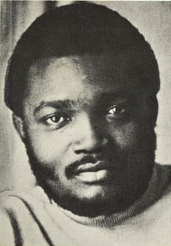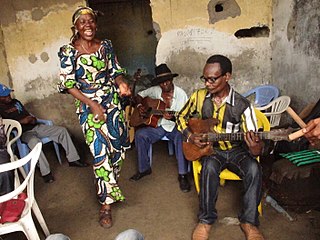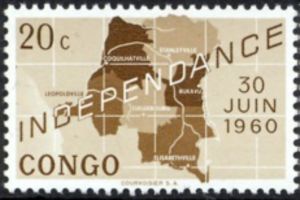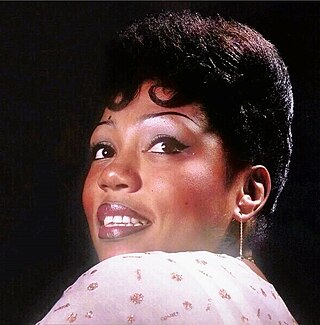Related Research Articles

Congolese music is one of the most influential music forms of the African continent. Since the 1930s, Congolese musicians have had a huge impact on the African musical scene and elsewhere. Many contemporary genres of music, such as Kenyan Benga and Colombian Champeta, have been heavily influenced by Congolese music. In 2021, Congolese rumba joined other living traditions such as Jamaican reggae music and Cuban rumba on UNESCO's "intangible cultural heritage of humanity" list.

Soukous is a genre of dance music originating from the Democratic Republic of the Congo and the Republic of the Congo. It derived from Congolese rumba in the 1960s, with faster dance rhythms and bright, intricate guitar improvisation, and gained popularity in the 1980s in France. Although often used by journalists as a synonym for Congolese rumba, both the music and dance associated with soukous differ from more traditional rumba, especially in its higher tempo, song structures and longer dance sequences.

François Luambo Luanzo Makiadi was a Congolese musician. He was a major figure in 20th-century Congolese music, and African music in general, principally as the leader for over 30 years of TPOK Jazz, the most popular and significant African band of its time and arguably of all time. He is referred to as Franco Luambo or simply Franco. Known for his mastery of African Rumba, he was nicknamed by fans and critics "Sorcerer of the Guitar" and the "Grand Maître of Zairean Music", as well as Franco de Mi Amor by female fans. His most known hit, "Mario", sold more than 200,000 copies and was certified gold. In 2023, Rolling Stone ranked him at number 71 on its list of the 250 Greatest Guitarists of All Time.

Zaïko Langa Langa is a Congolese rumba band formed in Kinshasa, in December 1969. Established by D.V. Moanda, Henri Mongombe, Marcellin Delo and André Bita, the band evolved from the Orchestre Bel Guide National, which is seen as Zaïko's predecessor.

Joseph Athanase Tshamala Kabasele, popularly known as Le Grand Kallé, was a Congolese singer and bandleader, considered the father of modern Congolese music. He is best known for his role as leader of the band, Le Grand Kallé et l'African Jazz, in which capacity he was involved in a number of noted songs, including Indépendance Cha Cha.

Ndombolo, also known as dombolo, is a genre of dance music originating in the Democratic Republic of the Congo. Derived from soukous in the 1990s, with fast-paced hip-swaying dance rhythms, often accompanied by upbeat, percussion-driven music, the style became widespread in the mid-1990s and the subsequent decade, dominating dancefloors in central, eastern, and western Africa. It inspired West African popular music, coupé-décalé, Kuduro, and East African dance music.

Congolese rumba, also known as African rumba, is a dance music genre originating from the Republic of the Congo and Democratic Republic of the Congo. With its rhythms, melodies, and lyrics, Congolese rumba has gained global recognition and remains an integral part of African music heritage. In December 2021, it was added to the UNESCO list of intangible cultural heritage.

Ngoma was one of the first record labels intended to provide local African music to the people of the Democratic Republic of the Congo. The name Ngoma came from the Kikongo word for drum. The label was created in 1948 by the Greek businessman Nicolas Jéronimidis, and was active until 1968. Its catalog included many known artists at that time including Camille Feruzi, who is said to have popularized rumba during the 1930s, Antoine Wendo Kolosoy, one of the biggest names of all-time in Congolese music, the Angolan Manuel d'Oliveira, Léon Bukasa, Antoine Mundanda, Paul Mwanga and Albert Luampasi, the guitarist who is said to have taught the famous Congolese musician François Luambo Makiadi (Franco) his first guitar chords.
Gilbert Youlou Mabiala, popularly known as Prince Youlou, is a Congo music recording artist, composer and vocalist, in the Republic of the Congo (Congo-Brazzaville). He was once a member of the Congo Music band TPOK Jazz which dominated the Congolese music scene from the 1960s through the 1980s.

"Indépendance Cha Cha" was a song performed by Joseph Kabasele from the group L'African Jazz in the popular Congolese rumba style. The song has been described as "Kabasele's most memorable song" and one of the first Pan-African hits.
Paul Mwanga (1932–2016) was a vocalist and composer. He was one of the early pioneers of Congolese rumba. He was born in Angola.
Opika was an early record label in the Congo, which recorded and promoted African pop, guitar, and rumba - not only from the Congo, but from Cameroon and Ghana as well. The label also recognized the value of ethnographic recordings, which were featured on a number of their releases. Started by brothers Gabriel Moussa Benetar and Joseph Benetar, from the Greek island of Rhodes, Opika was a prodigious producer of 78 rpm shellac recordings through the late 1950s. The company was initially called "Kina," but the name was subsequently changed to “Opika” from a phrase in Lingala, “opika pende” meaning “stand firm”. The name Opika was chosen in some sense as a challenge to the reigning and monolithic recording house Ngoma that this new recording company was a force to be reckoned with. The label was the first to sign Joseph Kabaselle who, along with other Opika session players Nico and Déchaud formed the band African Jazz, which contributed heavily to the evolving Latin-style Congolese rumba. The label also gave rise to the careers of many early rumba stars in the Congo, such as Jhimmy and Paul Mwanga.

Lucie Eyenga was a vocalist, and one of the early pioneers of soukous music. She was born in Bandaka in the Belgian Congo.
Editions Esengo was a record studio in the Congo, which is noted for assembling to their label Rock-a-Mambo, African Jazz, and Conga Jazz, three of the great powerhouse bands of Congolese rumba. Esengo is taken from the Lingala language, and is the word for "happiness" or "joy."

Elisabeth Finant, cognomenously known as Abeti Fina-Masikini or simply Abeti Masikini, was a Congolese singer, composer, bandleader, and philanthropist. With a nearly three-decades-long career, she was a significant figure in 20th-century Congolese and African popular music. Often referred to as the "Queen of Soukous", she is noted for advocating gender equality, modernizing Congolese music, and inspiring successive generations of musicians. Her band, Les Redoutables, was a launching pad for numerous female artists.
Radio Congo Belge was a radio broadcaster in the Belgian Congo which played an important role in the early development and popularisation of Congolese rumba music across Africa in the aftermath of World War II.
Franklin Boukaka was a Congolese baritone singer, guitarist, and songwriter who is recognized as a pioneer of Congolese popular music. He performed in bands based in each of "the two Congos," i.e., the countries now named the Republic of the Congo and the Democratic Republic of the Congo; toured worldwide; achieved broad popularity; took outspoken political stances; and is widely believed to have been the victim of an extrajudicial execution during an attempted coup in the Republic of the Congo.

"Mario" is a song by Congolese guitarist Franco and his group TPOK Jazz from his eponymous 1985 album. It is considered to be the musician's biggest hit.

Adou Elenga was a Congolese singer-songwriter, composer and guitarist. Signed on the Ngoma label since 1950, during his musical career, he composed several hits such as "Mokili Ekobaluka", which is his best known. The song is considered by Congolese as a prophecy of their independence. Other hits are "Maria Tchebo", "Pyramide", "Tout Le Monde Samedi Soir". His music was covered by many artists, including Sam Mangwana and Bopol Mansiamina.

Sebene, also known as seben, is an instrumental section commonly played in Congolese rumba. It is usually played towards the end of the song and is the dancing section where the lead and rhythm guitars take the lead in the dance. It is characterized by the repetition of a specific number of notes during the passage of second chords: one major chord and one-seventh chord, which gives rise to the Lingala derivation "sebene," derived from the English numeral "seven" or its ordinal rendition.
References
- ↑ Stewart, Gary (November 17, 2003). Rumba on the River: A History of the Popular Music of the Two Congos. Verso. p. 35. ISBN 1859843689.
- ↑ Bemba, Audifax (21 October 2023). "Le guitariste Zacharie ÉLENGA alias Jhimmy L'hawaïenne: un baobab au milieu du village" [Guitarist Zacharie ÉLENGA aka Jhimmy L'Hawaïenne: a baobab in the middle of the village]. Congopage (in French). Retrieved 31 August 2024.
- ↑ Nzonga, Jean-Pierre François Nimy (2010). Dictionnaire des immortels de la musique congolaise modern. ACADEMIA. pp. 98–99. ISBN 978-2872099771.
- ↑ Ossinondé, Clément (6 August 2010). "Le duo mémorable Jhimmy na Mwanga" [The memorable duo Jhimmy na Mwanga]. Congopage (in French). Retrieved 7 September 2024.
- ↑ "Le duo mémorable Jhimmy na Mwanga à l'origine d'innovations historiques, by Clément Ossinonde".
- ↑ "Worldservice Website of African and Latin Music".
- ↑ "Le duo mémorable Jhimmy na Mwanga à l'origine d'innovations historiques, by Clément Ossinonde".
- ↑ Stewart, Gary (November 17, 2003). Rumba on the River: A History of the Popular Music of the Two Congos. Verso. p. 36. ISBN 1859843689.